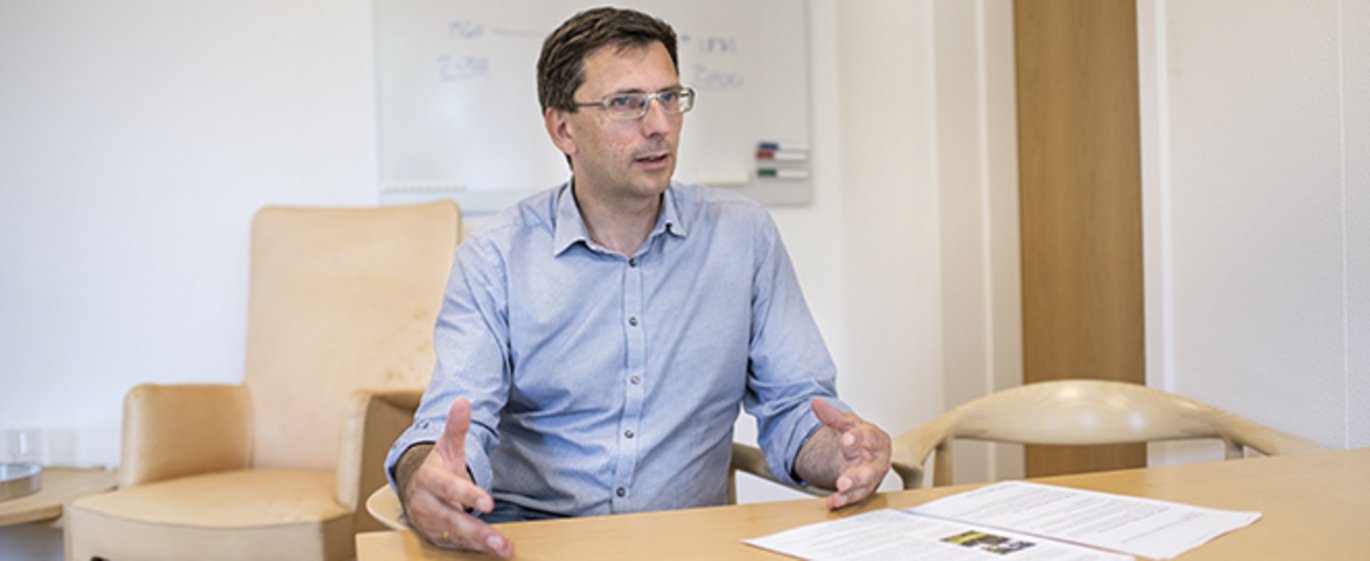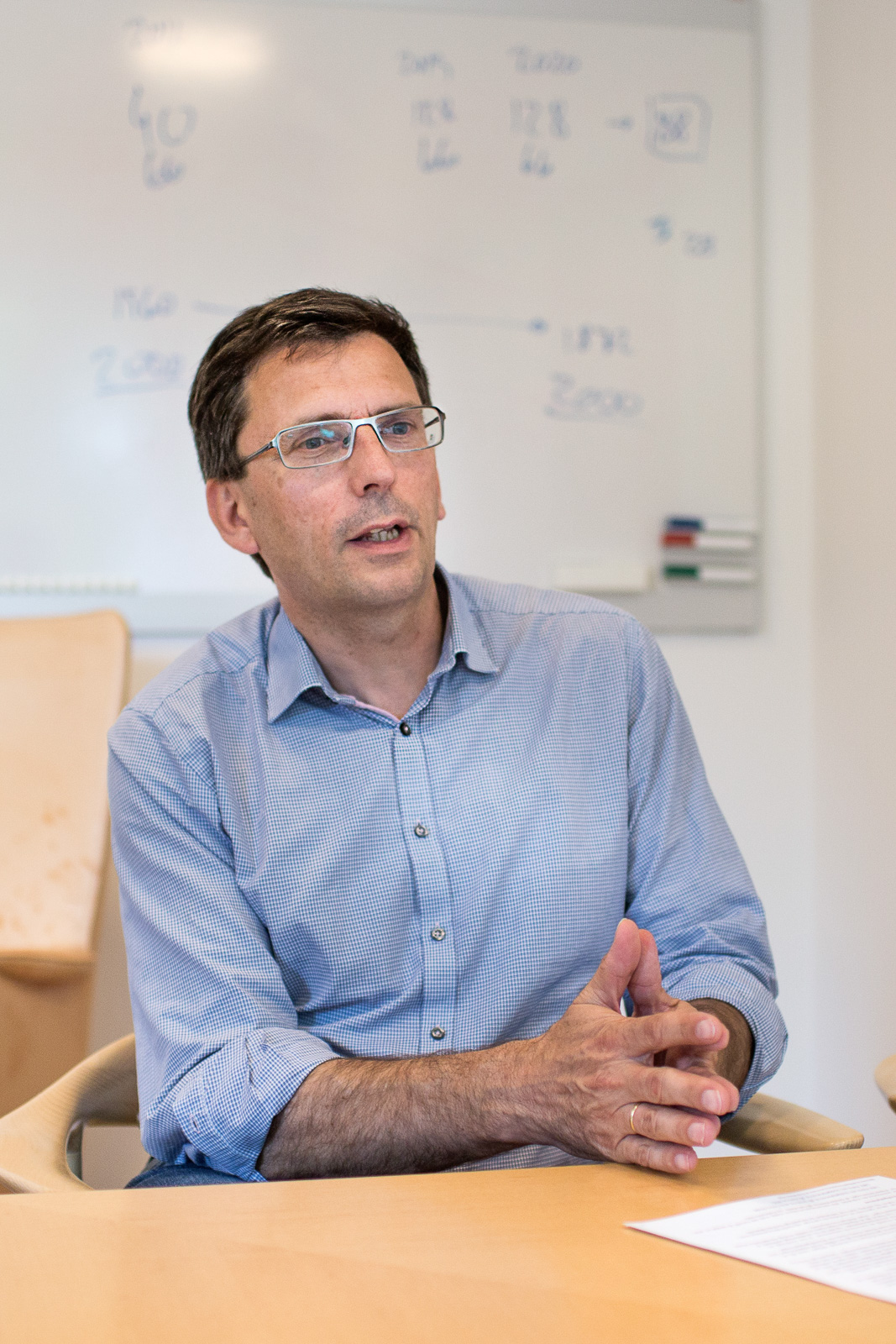AU must save DKK 280 million over the next four years
The senior management team has just received the board’s approval for a DKK 280 million cost reduction plan to be implemented over the next four years. How the cost reductions are to be made must now be clarified by the faculties, meaning that both employees and students will have to wait until after the summer holidays before finding out if and how the plan will affect them.



University Director Arnold Boon and the senior management team have been busy with their economy programmes this spring, meticulously combing through AU’s budget for the next four years. And on the basis of this work, the senior management team have calculated how much AU must save during the coming years. Some might describe the millions of Danish kroner that must be saved as a problem. The university director describes it as a challenge.
"As a result of the Finance Act, from now until 2019 we face a challenge which according to our estimates amounts to a total of DKK 280 million in revenues that we will miss out on. That means we have had to find corresponding cost reductions."
The senior management team has now found these – or rather, they have drawn-up a plan for how they must be found. In general terms, the senior management team has looked for savings in the administration, the senior management team's strategic funds, and building operations and maintenance, including electricity, water and heating.
The DKK 100 million in cost reductions that have already been initiated in the administration during the period 2015-2019 are included in the senior management team's cost reduction plan.
READ MORE: Joint union representative: Crucial that there is enough time to phase-in cost reductions
"The three initiatives provide effective savings, but not enough on their own to reach our target. So the remainder of the cost reductions must be found at the faculties and departments. That can be done in various ways. At Arts, the degree programme resizing and the educational cost reductions mean that the faculty will be smaller. So focus here is on streamlining and reducing costs on the degree programmes and their administration. On the other hand, BSS could almost reach their goal by contributing less to administration and buildings operations," explains the university director.
Arnold Boon emphasises that the announced plan is a general framework that sets out the cost reductions that have to made for the faculties. Now it is up to the faculties and the individual departments to realise them in specific cost reductions. For the same reason, employees and students can first expect to find out about whether and how the cost reductions affect them after the summer holidays.
"We need to keep in mind that this is an ongoing process. It’s not as if there will be drastic cutbacks like those we have seen previously at AU and other universities. But we must continuously look at how we should prioritise and how we can streamline the administration and the degree programmes."
Background for the cost reductions at AU
AU's revenues will decrease during the coming years as a result of the government's savings in the field of research and education. Among other things, DKK 1.4 billion in cutbacks have been made in government funding for research and the universities have been required to make a reallocation contribution of two per cent per year over the next four years. On top of this there are the financial consequences of the degree programme resizing reform and the study progress reform.
The senior management team expects AU's revenues to fall by DKK 280 million in the period 2016-2019.
This is where AU will find cutbacks:
- The administration: DKK 63 million
- The senior management team’s strategic funds (USM): DKK 22 million
- Buildings operations and maintenance, including electricity, water and heating: DKK 27 million
- Cost reductions at the faculties: DKK 171 million
Cost reductions of approximately DKK 70 million have already been achieved from 2015 to 2016, in particular on various joint expenses and pools in the administration as well as the senior management team’s strategic funds (USM).
Source: University Director Arnold Boon
No major round of dismissals – but there may be some dismissals
Arnold Boon has been quoted in several contexts as saying he does not expect a round of dismissals like the one in 2014, though he makes no secret of the fact that the cost reductions can lead to dismissals.
Do you have a general idea of how many employees will disappear and how many positions will be done away with in connection with the cost reductions?
"No not yet. That’s a process that will take place after the summer holidays. There is no doubt that there will be fewer of us. But again, these are ongoing adjustments and our staff turnover is significantly greater than what we need to save in total. So adjustments can therefore largely be achieved by natural wastage," says Arnold Boon.
He goes on to say that the board also has an interest in finding out how many positions will be cut:
"Here we’ve said that we will present a figure once the faculties have specified their cost reduction plans."
Extending the administration cost reductions
In connection with the budget plan, the senior management team recently decided to extend the annual savings of two per cent of the administration, which otherwise run from 2015 to 2019. For now, the cost reductions will also apply in 2020. “But if the politicians decide to extend the reallocation contribution beyond the current four-year period, a further extension may be required," says Arnold Boon. He thinks it is obvious that if this is the case, then the administration is where savings should be made.
"If politicians impose a two per cent cost reduction on the university in future, it would be illogical to make those savings on our core competences while exempting the administration," he says.
Smarter administration - but how?
Despite the extension of the annual cost reductions at the administration, Arnold Boon maintains his position that the cost reductions will not automatically lead to the administrative staff having fewer tasks in front of them.
"We need to look into whether we are undertaking the right tasks. But I still believe that in addition to prioritising among our tasks, we must continue to deliver a good administrative service by optimising and digitalising our workflows, or through digitisation and process optimisation. We owe it to our researchers and students that we continue to develop the administration."
Can you give specific examples of processes which can be optimised in the administration?
"So far, when we have appointed new employees, secretaries have ended up with seven post-it stickers around their screen with all the things they need to remember to do. Like registering the new employee in this, that and the other system, ordering an access card and so on. Until the end of the year we are implementing a new system called 'Check&go'. This digitalises the whole process in one workflow instead of the many manual workflows," explains Arnold Boon.
He also explains that work is currently taking place on one joint timetabling system, rather than the three systems being used at AU today.
Could that be letting employees empty the trash themselves and that kind of thing?
"No, I’m thinking more of the administrative processes. That’s where we can still optimise the number of actions in a process and also look at extra processes, which we could also call waste. Where someone has to go back to the process, because information about a case is not complete. This can be done by drawing up more precise descriptions of the administrative process."
Uncertainties
Even though the senior management team has meticulously attempted to get a precise overview of AU's finances for the coming years, the figures are characterised by uncertainty.
One of the many factors is the difficulty of predicting how students will behave when it comes to study progress, explains Arnold Boon.
"But what makes it even more difficult is that we’re also dependent on the other universities' behaviour. Even if AU does well, the total completion bonus is also dependent on whether the other universities also do well, so it’s extremely difficult to predict," he says.
Plus, there is also the issue of the coming Finance Act, which will be presented at the end of the summer. Arnold Boon has the following comment:
"We should probably expect that the two per cent cost reduction (the reallocation contribution, ed.) is here to stay. On the other hand, I also think there are signs that the government is serious about its goal of spending one per cent of Gross Domestic Product or GDP on research. If that remains in force, then it’s hardly likely that there will be more cost reductions in the research field."
Translated by Peter Lambourne

